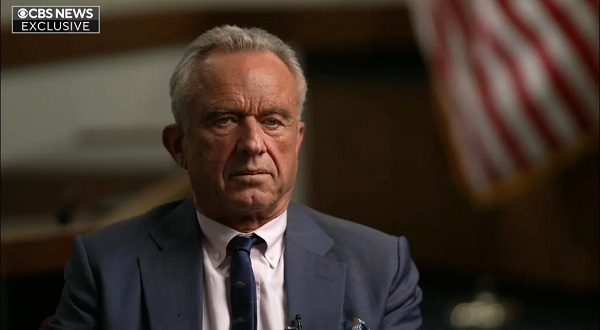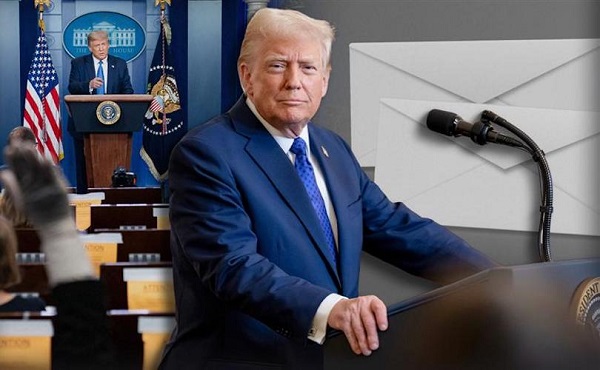Business
Trump Needs To Take Away What Politicians Love Most — Pork

Nobel Prize-winning economist Milton Friedman in an interview on CSPAN, Sept. 30, 2000

From the Daily Caller News Foundation
By Stephen Moore
Shortly before his death in 2006, I had the privilege of interviewing Milton Friedman over dinner in San Francisco. The last question I asked him was: What are the three things we had to do to make America more prosperous?
His answer I have never forgotten: “First, allow universal school choice; second, expand free trade; third and most importantly, cut government spending.” That was long before Presidents Barack Obama and Joe Biden came along.
There are not too many problems in America that cannot be traced back to the growth of big and incompetent government.
It is notable that the two big bursts of inflation during modern times both occurred when government spending exploded. The first was the gigantic expansion of the LBJ “war on poverty” welfare state in the 1970s with prices nearly doubling, and then the post-COVID era spending blitz in the last year of Trump and then the Biden $6 trillion spending spree with the CPI sprinting from 1.5% to 9.1%.
Coincidence? Maybe. But I doubt it.
The connection between government flab and the decline in the purchasing power of the dollar is obvious. In both cases the Washington spending blitz was funded by Federal Reserve money printing. The helicopter money caused prices to surge. (I still find it laughable that 11 Nobel prize-winning economists wrote in the New York Times in 2021: Don’t worry, the Biden multi-trillion-dollar spending spree won’t cause inflation.)
The avalanche of federal spending hasn’t stopped even though COVID ended more than three years ago. We are three months into the 2025 fiscal year and on pace to spend an all-time high $7 trillion and borrow $2 trillion. If we stay on this course, the federal budget could reach $10 trillion over the next decade.
This road to financial perdition cannot stand. It risks blowing up the Trump presidency.
Upon entering office, Trump should on day one call for a package of up to $500 billion of rescissions — money that the last Congress appropriated but has not been spent yet. Cancelling the green energy subsidies alone could save nearly $100 billion. Why are we still spending money on COVID?
We could save tens of billions by ending corporate welfare programs — such as the wheel barrels full of tax dollars thrown at companies like Intel in the CHIPS Act. The Elon Musk Department of Government Efficiency is already identifying low hanging fruit that needs to be cut from the tree.
Along with extending the Trump tax cut of 2017, this erasure of bloated federal spending is critical for economic revival and for reversing the income losses to the middle class under Biden.
This is especially urgent because the curse of inflation is NOT over. Since the Fed started cutting interest rates in October, commodity prices are up nearly 5% and the mortgage rates have again hit 7% — in part because the combination of cheap money and government expansion is a toxic economic brew — as history teaches us.
Nothing could suck the oxygen and excitement out of the new Trump presidency more than a resumption of inflation at the grocery store and the gas pump. Trump’s record-high approval rating will sink overnight if the cost of everything starts rising again.
Cutting spending won’t be easy. The resistance won’t just come from Bernie Sanders Democrats. Trump will have to convince lawmakers in his own party — many of whom are already defending green-new-deal pork projects in their districts.
This is why Trump should make the case in his inaugural address that downsizing government is the moral equivalent of war. Borrow a line from Nancy Reagan: just say no — to runaway government spending. Say yes to what Friedman titled his famous book: “Capitalism and Freedom.”
Stephen Moore is a visiting fellow at the Heritage Foundation. His new book, coauthored with Arthur Laffer, is “The Trump Economic Miracle.”
Business
Musk Slashes DOGE Savings Forecast By 85%


From the Daily Caller News Foundation
By Thomas English
Elon Musk announced Thursday that the Department of Government Efficiency (DOGE) is now targeting $150 billion in federal savings for fiscal year 2026 — dramatically scaling back earlier claims of slashing as much as $2 trillion.
Musk initially projected DOGE would deliver $2 trillion in savings by targeting government waste, fraud and abuse. That figure was halved to $1 trillion earlier this year, but Musk walked it back again at Thursday’s Cabinet meeting, saying the revised $150 billion projection will “result in better services for the American people” and ensure federal spending “in a way that is sensible and fair and good.”
“I’m excited to announce we anticipate saving in FY ’26 from a reduction of waste and fraud a reduction of $150 billion dollars,” Musk said. “And some of it is just absurd, like, people getting unemployment insurance who haven’t been born yet. I mean, I think anyone can appreciate — I mean, come on, that’s just crazy.”
The announcement marks the latest in a string of revised projections from Musk, who has become the face of President Donald Trump’s aggressive federal efficiency agenda.
“Your people are fantastic,” the president responded. “In fact, hopefully they’ll stay around for the long haul. We’d like to keep as many as we can. They’re great — smart, sharp, finding things that nobody would have thought of.”
Musk originally floated the $2 trillion figure during campaign appearances last fall.
“I think we could do at least $2 trillion,” Musk said at the Madison Square Garden campaign rally in November. “At the end of the day, you’re being taxed — all government spending is taxation … Your money is being wasted, and the Department of Government Efficiency is going to fix that.”
By January, he softened expectations to a “really quite achievable” $1 trillion target before downsizing that figure again this week.
“Our goal is to reduce the deficit by a trillion dollars,” Musk told Fox News’ Bret Baier “Looked at in total federal spending, to drop the federal spending from $7 trillion to $6 trillion by eliminating waste, fraud and abuse … Which seems really quite achievable.”
DOGE’s website, which tracks cost-saving initiatives and contract cancellations, currently calculates total federal savings at $150 billion.
2025 Federal Election
Taxpayers urge federal party leaders to drop home sale reporting to CRA

Party leaders must clarify position on home equity tax
The Canadian Taxpayers Federation is calling on all party leaders to prove they’re against home equity taxes by pledging to immediately remove the Canada Revenue Agency reporting requirement on the sale of primary residences.
“Canadians rely on the sale of their homes to pay for their golden years,” said Carson Binda, CTF B.C. Director. “After the government spent hundreds of thousands of dollars flirting with home taxes, taxpayers need party leaders to prove they won’t tax our homes by removing the CRA reporting requirement.”
Right now, the profit you make from selling your home is exempt from the capital gains tax. However, in 2016, the federal government mandated that Canadians report the sale of their homes to the CRA, even though it’s tax exempt.
The Canada Mortgage and Housing Corporation also spent at least $450,000 to study and influence public opinion in favour of home equity taxes. The report recommended a home equity tax targeting the “housing wealth windfalls gained by many homeowners while they sleep and watch TV.”
“A home equity tax would hurt seniors saving for their golden years and make homes more expensive for younger generations,” Binda said. “If the federal government isn’t planning on imposing a home equity tax, then Canadians shouldn’t be forced to report the sale of their home to the CRA.”
-

 2025 Federal Election2 days ago
2025 Federal Election2 days agoResearchers Link China’s Intelligence and Elite Influence Arms to B.C. Government, Liberal Party, and Trudeau-Appointed Senator
-

 Business2 days ago
Business2 days agoTimeline: Panama Canal Politics, Policy, and Tensions
-

 COVID-192 days ago
COVID-192 days agoFauci, top COVID officials have criminal referral requests filed against them in 7 states
-

 2025 Federal Election2 days ago
2025 Federal Election2 days agoPoilievre Announces Plan To Cut Taxes By $100,000 Per Home
-

 Health2 days ago
Health2 days agoRFK Jr. Shuts Down Measles Scare in His First Network Interview as HHS Secretary
-

 Health2 days ago
Health2 days agoRed Deer Hospital Lottery – Previous Supporter Draw Deadline!
-

 Bjorn Lomborg2 days ago
Bjorn Lomborg2 days agoThe stupidity of Net Zero | Bjorn Lomborg on how climate alarmism leads to economic crisis
-

 International2 days ago
International2 days agoTrump White House will ignore reporter emails that include ‘preferred pronouns’ in signature





